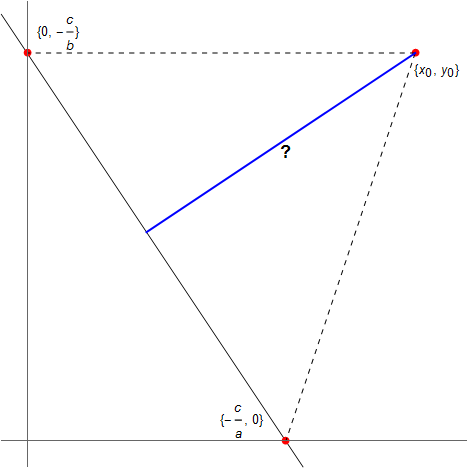Here is a direct approach which demonstrates the difficulties caused by 5 parameters $a,b,c,x0,y0$.
Minimize[{Sqrt[({x, y} - {x0, y0}) . ({x, y} - {x0, y0})],
a*x + b*y + c == 0 && a^2 + b^2 > 0}, {x, y}] // First
Piecewise[{{Sqrt[x0^2], (x0 == 0 && c == 0 && a > 0 && b == 0) || (x0 == 0 && c == 0 && a < 0 && b == 0)}, {Sqrt[(c + a*x0)^2/a^2], (x0 > 0 && a > 0 && b == 0) || (x0 > 0 && a < 0 && b == 0) || (x0 < 0 && a > 0 && b == 0) || (x0 < 0 && a < 0 && b == 0)}, {Sqrt[(c^2 + a^2*x0^2)/a^2], (x0 == 0 && c > 0 && a > 0 && b == 0) || (x0 == 0 && c > 0 && a < 0 && b == 0) || (x0 == 0 && c < 0 && a > 0 && b == 0) || (x0 == 0 && c < 0 && a < 0 && b == 0)}, {Sqrt[(c + b*y0)^2/b^2], (x0 > 0 && a == 0 && b > 0) || (x0 > 0 && a == 0 && b < 0) || (x0 < 0 && a == 0 && b > 0) || (x0 < 0 && a == 0 && b < 0)}, {Sqrt[(c + a*x0 + b*y0)^2/(a^2 + b^2)], (x0 < 0 && a < 0 && b > 0) || (x0 > 0 && a > 0 && b > 0) || (x0 > 0 && a > 0 && b < 0) || (x0 > 0 && a < 0 && b > 0) || (x0 > 0 && a < 0 && b < 0) || (x0 < 0 && a > 0 && b > 0) || (x0 < 0 && a > 0 && b < 0) || (x0 < 0 && a < 0 && b < 0)}, {Sqrt[x0^2 + y0^2], (x0 == 0 && c == 0 && a == 0 && b > 0) || (x0 == 0 && c == 0 && a == 0 && b < 0)}, {Sqrt[(c^2 + a^2*x0^2 + b^2*x0^2 + 2*b*c*y0 + b^2*y0^2)/(a^2 + b^2)], (x0 == 0 && c > 0 && a > 0 && b > 0) || (x0 == 0 && c > 0 && a > 0 && b < 0) || (x0 == 0 && c > 0 && a < 0 && b > 0) || (x0 == 0 && c > 0 && a < 0 && b < 0) || (x0 == 0 && c < 0 && a > 0 && b > 0) || (x0 == 0 && c < 0 && a > 0 && b < 0) || (x0 == 0 && c < 0 && a < 0 && b > 0) || (x0 == 0 && c < 0 && a < 0 && b < 0)}, {Sqrt[x0^2 + (b^2*y0^2)/(a^2 + b^2)], (x0 == 0 && c == 0 && a > 0 && b > 0) || (x0 == 0 && c == 0 && a > 0 && b < 0) || (x0 == 0 && c == 0 && a < 0 && b > 0) || (x0 == 0 && c == 0 && a < 0 && b < 0)}, {Sqrt[x0^2 + y0^2 + (c*(c + 2*b*y0))/b^2], (x0 == 0 && c > 0 && a == 0 && b > 0) || (x0 == 0 && c > 0 && a == 0 && b < 0) || (x0 == 0 && c < 0 && a == 0 && b > 0) || (x0 == 0 && c < 0 && a == 0 && b < 0)}}, Infinity]
Its execution takes more than dozen minutes.
FullSimplify[%, Assumptions -> a^2 + b^2 > 0 && {a, b, x0, y0} ∈ Reals]
Piecewise[{{0, b == 0 && c == 0 && x0 == 0}, {Sqrt[(c + a*x0)^2/a^2], b == 0 && x0 != 0}, {Sqrt[c^2/a^2], b == 0 && x0 == 0 && c != 0}, {Sqrt[(c + b*y0)^2/b^2], a == 0 && (c != 0 || x0 != 0)}, {Sqrt[(c + a*x0 + b*y0)^2/(a^2 + b^2)], a != 0 && b != 0 && x0 != 0}, {Abs[y0], a == 0 && c == 0 && x0 == 0}, {Sqrt[(c + b*y0)^2/(a^2 + b^2)], x0 == 0 && a != 0 && b != 0 && c != 0}}, (Abs[b]*Abs[y0])/Sqrt[a^2 + b^2]]
At last,
FullSimplify[Piecewise[{{0, b == 0 && c == 0 && x0 == 0}, {Sqrt[(c + a*x0)^2/a^2],
b == 0 && x0 != 0}, {Sqrt[c^2/a^2],
b == 0 && x0 == 0 && c != 0},
{Sqrt[(c + b*y0)^2/b^2], a == 0 && (c != 0 || x0 != 0)},
{Sqrt[(c + a*x0 + b*y0)^2/(a^2 + b^2)],
a != 0 && b != 0 && x0 != 0},
{Abs[y0], a == 0 && c == 0 && x0 == 0},
{Sqrt[(c + b*y0)^2/(a^2 + b^2)],
x0 == 0 && a != 0 && b != 0 &&
c != 0}}, (Abs[b]*Abs[y0])/Sqrt[a^2 + b^2]] -
Sqrt[(c + a*x0 + b*y0)^2/(a^2 + b^2)],
Assumptions -> a^2 + b^2 > 0 && {a, b, x0, y0} ∈ Reals]
0
FullSimplify[Sqrt[(c + a*x0 + b*y0)^2/(a^2 + b^2)] -
RealAbs[(c + a*x0 + b*y0)]/Sqrt[(a^2 + b^2)],
Assumptions -> a^2 + b^2 > 0 && {a, b, x0, y0} ∈ Reals]
0


